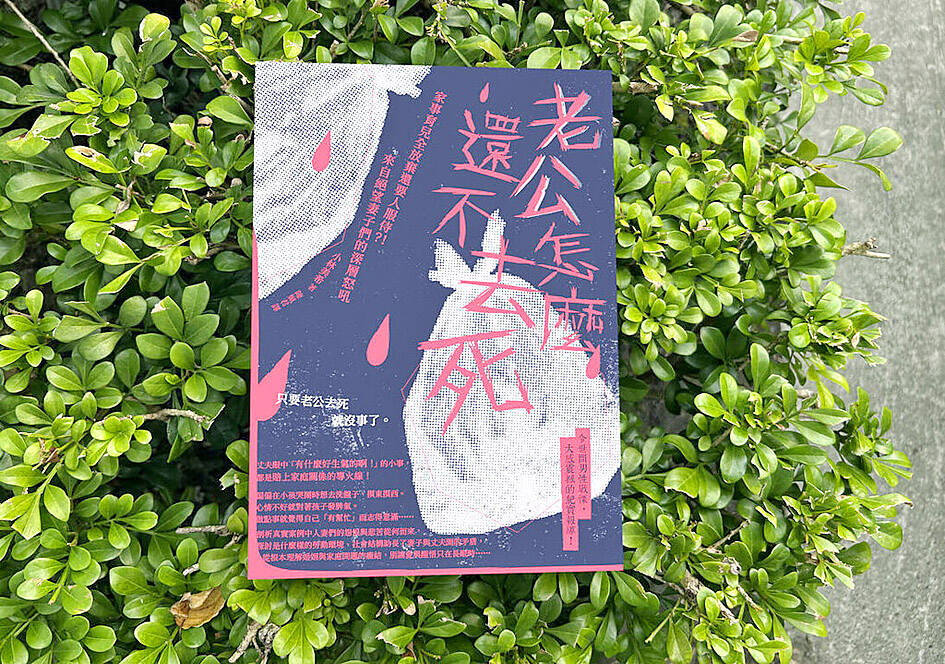Libraries across Taiwan have seen a surge in demand for a Japanese non-fiction book with the provocative title Why Doesn’t My Husband Just Go Die? (老公怎麼還不去死).
As of Monday, 2,373 people had joined waitlists for the book, including 771 in Taipei, 80 in New Taipei City, 160 in Taoyuan, 520 in Taichung, 559 in Taoyuan and 283 in Kaohsiung, municipal public library data showed.
The book, by former Economist journalist Miki Kobayashi, features profiles of multiple women in Japan describing their experiences with pregnancy, childcare and domestic duties, often borne at the expense of their own careers and with little help from their spouses.

Photo courtesy of Taiwan Tohan Co. Ltd.
The inequality of the situation creates bitterness and fissures in the women’s marriages, Kobayashi writes.
In some cases they consider divorce, but ultimately decide against it due to factors such as age, money, social expectations or their children, and are left secretly thinking that their problems would be solved by their husband’s death.
Kobayashi blames the situation on various factors, including government policies and Japan’s male-dominated work culture, which she argues leaves men little time to share duties at home, and must be reformed for real progress to be made toward gender equality.
Kobayashi’s book was originally published in 2016 with the Japanese title The Wives Who Hope Their Husbands Die.
The simplified Chinese edition has the slightly milder title The Wives Who Hate But Do Not Get Divorced.
Given that the book’s traditional Chinese version was only published in 2022, its sudden increase in popularity may owe more to its recent discussion in online forums in Taiwan, rather than the eye-catching title alone.

The Chinese military has built landing bridge ships designed to expand its amphibious options for a potential assault on Taiwan, but their combat effectiveness is limited due to their high vulnerability, a defense expert said in an analysis published on Monday. Shen Ming-shih (沈明室), a research fellow at the Institute for National Defense and Security Research, said that the deployment of such vessels as part of the Chinese People’s Liberation Army (PLA) Navy’s East Sea Fleet signals a strong focus on Taiwan. However, the ships are highly vulnerable to precision strikes, which means they could be destroyed before they achieve their intended

The Taiwan Experience Education Program (TEEP) has funded short-term internships in Taiwan for more than 4,500 young people from more than 40 countries since 2015, with the goal of attracting and retaining international talent, the Ministry of Education said yesterday. Fifty-five colleges launched 514 projects this year, including in fields such as semiconductors, artificial intelligence, medicine and biotechnology, green energy, and sustainability, it said. The program provides research and practical internships in Taiwan for two to six months, and offers cultural exchange and networking opportunities, the ministry said. For example, National Formosa University’s Embedded System and Autopilot Laboratory developed two solar-powered drones in

GLOBAL: Although Matsu has limited capacity for large numbers of domestic tourists, it would be a great high-end destination for international travelers, an official said Lienchiang County’s (Matsu) unique landscape and Cold War history give it great potential to be marketed as a destination for international travelers, Tourism Administration Director General Chen Yu-hsiu (陳玉秀) said at the weekend. Tourism officials traveled to the outlying island for the Matsu Biennial, an art festival that started on Friday to celebrate Matsu’s culture, history and landscape. Travelers to Matsu, which lies about 190km northwest of Taipei, must fly or take the state-run New Taima passenger ship. However, flights are often canceled during fog season from April to June. Chen spoke about her vision to promote Matsu as a tourist attraction in

Taipei resident Mu Chu-hua caught some glimpses of China’s mighty military parade on YouTube on Wednesday. As she watched hypersonic missiles roll down Beijing’s Changan Avenue and troops march in lockstep, she did not feel like they posed a threat to Taiwan. Mu, a 69-year-old retiree, said she saw the parade as simply a way for Chinese President Xi Jinping (習近平) to “say thank you to the troops.” “I thought it was quite normal,” she said. “It was very cool.” China’s military parade commemorating the end of World War II was being watched internationally for insights into Beijing’s military advances and its show